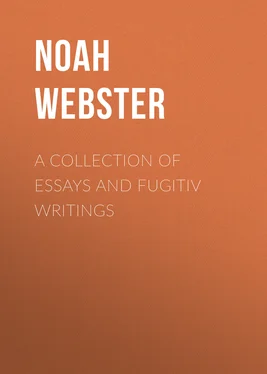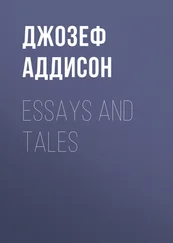Noah Webster - A Collection of Essays and Fugitiv Writings
Здесь есть возможность читать онлайн «Noah Webster - A Collection of Essays and Fugitiv Writings» — ознакомительный отрывок электронной книги совершенно бесплатно, а после прочтения отрывка купить полную версию. В некоторых случаях можно слушать аудио, скачать через торрент в формате fb2 и присутствует краткое содержание. Жанр: foreign_prose, foreign_antique, на английском языке. Описание произведения, (предисловие) а так же отзывы посетителей доступны на портале библиотеки ЛибКат.
- Название:A Collection of Essays and Fugitiv Writings
- Автор:
- Жанр:
- Год:неизвестен
- ISBN:нет данных
- Рейтинг книги:5 / 5. Голосов: 1
-
Избранное:Добавить в избранное
- Отзывы:
-
Ваша оценка:
- 100
- 1
- 2
- 3
- 4
- 5
A Collection of Essays and Fugitiv Writings: краткое содержание, описание и аннотация
Предлагаем к чтению аннотацию, описание, краткое содержание или предисловие (зависит от того, что написал сам автор книги «A Collection of Essays and Fugitiv Writings»). Если вы не нашли необходимую информацию о книге — напишите в комментариях, мы постараемся отыскать её.
A Collection of Essays and Fugitiv Writings — читать онлайн ознакомительный отрывок
Ниже представлен текст книги, разбитый по страницам. Система сохранения места последней прочитанной страницы, позволяет с удобством читать онлайн бесплатно книгу «A Collection of Essays and Fugitiv Writings», без необходимости каждый раз заново искать на чём Вы остановились. Поставьте закладку, и сможете в любой момент перейти на страницу, на которой закончили чтение.
Интервал:
Закладка:
The progress of government in England has been the reverse: The people have been gaining freedom by intrenching upon the powers of the nobles and the royal prerogativs. These changes in government do not proceed from bills of rights , unalterable forms and perpetual establishments ; liberty is never secured by such paper declarations, nor lost for want of them. The truth is, Government originates in necessity, and takes its form and structure from the genius and habits of the people; and if on paper a form is not accommodated to those habits, it will assume a new form, in spite of all the formal sanctions of the supreme authority of a State. Were the monarchy of France to be dissolved, and the wisest system of republican government ever invented, solemnly declared, by the King and his council, to be the constitution of the kingdom; the people with their present habits, would refuse to receive it; and resign their privileges to their beloved sovereign. But so opposite are the habits of the Americans, that an attempt to erect a monarchy or an aristocracy over the United States, would expose the authors to the loss of their heads. 27 27 Some jealous people ignorantly call the proposed Constitution of Federal Government, an aristocracy . If such men are honest, their honesty deserves pity: There is not a feature of true aristocracy in the Constitution; the whole frame of Government is a pure Representativ Republic.
The truth is, the people of Europe, since they have become civilized, have, in no kingdom, possessed all the true principles of liberty. They could not therefore lose what they never possessed. There have been, from time immemorial, some rights of government, some prerogativs vested in some man or body of men, independent of the suffrages of the body of the subjects. This circumstance distinguishes the governments of Europe and of all the world, from those of America. There has been in the free nations of Europe an incessant struggle between freedom or national rights, and hereditary prerogativs. The contest has ended variously in different kingdoms; but generally in depressing the power of the nobility; ascertaining and limiting the prerogativs of the crown, and extending the privileges of the people. The Americans have seen the records of their struggles; and without considering that the objects of the contest do not exist in this country ; they are laboring to guard rights which there is no party to attack. They are as jealous of their rights, as if there existed here a King's prerogativs, or the powers of nobles, independent of their own will and choice, and ever eager to swallow up their liberties. But there is no man in America, who claims any rights but what are common to every man ; there is no man who has an interest in invading popular privileges, because his attempt to curtail another's rights, would expose his own to the same abridgement. The jealousy of people in this country has no proper object against which it can rationally arm them; it is therefore directed against themselves , or against an invasion which they imagine may happen in future ages. The contest for perpetual bills of rights against a future tyranny, resembles Don Quixote's fighting windmills; and I never can reflect on the declamation about an unalterable constitution to guard certain rights, without wishing to add another article, as necessary as those that are generally mentioned, viz. "that no future Convention or Legislature shall cut their own throats, or those of their constituents." While the habits of the Americans remain as they are, the people will choose their Legislature from their own body; that Legislature will have an interest inseparable from that of the people, and therefore an act to restrain their power in any article of legislation, is as unnecessary as an act to prevent them from committing suicide.
Mr. Jefferson, in answer to those who maintain that the form of government in Virginia is unalterable, because it is called a constitution , which, ex vi termini, means an act above the power of the ordinary Legislature, asserts that constitution , statute , law and ordinance , are synonymous terms, and convertible as they are used by writers on government. Constitutio dicitur jus quod a principe conditur. Constitutum, quod ab imperatoribus rescriptum statutumve est. Statutum, idem quod lex. 28 28 Calvini Lexicon Juridicum.
Here the words constitution , statute and law , are defined by each other; they were used as convertible terms by all former writers, whether Roman or British; and before the terms of the civil law were introduced, our Saxon ancestors used the correspondent English words, bid and set . 29 29 See Laws of the Saxon Kings.
From hence he concludes that no inference can be drawn from the meaning of the word, that a constitution has a higher authority than a law or statute. This conclusion of Mr. Jefferson is just.
He quotes Lord Coke also to prove that any parliament can abridge, suspend or qualify the acts of a preceding Parliament. It is a maxim in their laws, that "Leges posteriores priores contrarias abrogant." After having fully proved that constitution , statute , law and ordinance , are words of similar import, and that the constitution of Virginia is at any time alterable by the ordinary Legislature, he proceeds to prove the danger to which the rights of the people are exposed, for want of an unalterable form of government . The first proof of this danger he mentions, is, the power which the Assembly exercises of determining its own quorum. The British Parliament fixes its own quorum: The former Assemblies of Virginia did the same. During the war the Legislature determined that forty members should be a quorum to proceed to business, altho not a fourth part of the whole house. The danger of delay, it was judged, would warrant the measure. This precedent, our writer supposes, is subversive of the principles of the government, and dangerous to liberty.
It is a dictate of natural law that a majority should govern ; and the principle is universally received and established in all societies, where no other mode has been arbitrarily fixed. This natural right cannot be alienated in perpetuum ; for altho a Legislature, or even the body of the people, may resign the powers of government to forty, or to four men, when they please, yet they may likewise resume them at pleasure.
The people may, if they please, create a dictator on an emergency in war, but his creation would not destroy , but merely suspend the natural right of the Lex majoris partis . Thus forty members, a minority of the Legislature of Virginia, were empowered during a dangerous invasion, to legislate for the State; but any subsequent Assembly might have divested them of that power. During the operation of the law, vesting them with this power, their acts were binding upon the State; because their power was derived from the general sense of the State; it was actually derived from a legal majority. But that majority could, at any moment, resume the power and practice on their natural right.
It is a standing law of Connecticut, that forty men shall be a quorum of the House of Representativs, which consists of about 170 members. This law, I am confident, never excited a murmur, or a suspicion that the liberties of the people were in danger; yet this law creates an oligarchy; it is an infringement of natural right; it subjects the State to the possibility, and even the probability of being governed at times by a minority. The acquiescence of the State, in the existence of the law, gives validity, and even the sanction of a majority, to the acts of that minority; but the majority may at any time resume their natural right, and make the assent of more than half of the members, necessary to give validity to their determinations.
Читать дальшеИнтервал:
Закладка:
Похожие книги на «A Collection of Essays and Fugitiv Writings»
Представляем Вашему вниманию похожие книги на «A Collection of Essays and Fugitiv Writings» списком для выбора. Мы отобрали схожую по названию и смыслу литературу в надежде предоставить читателям больше вариантов отыскать новые, интересные, ещё непрочитанные произведения.
Обсуждение, отзывы о книге «A Collection of Essays and Fugitiv Writings» и просто собственные мнения читателей. Оставьте ваши комментарии, напишите, что Вы думаете о произведении, его смысле или главных героях. Укажите что конкретно понравилось, а что нет, и почему Вы так считаете.












